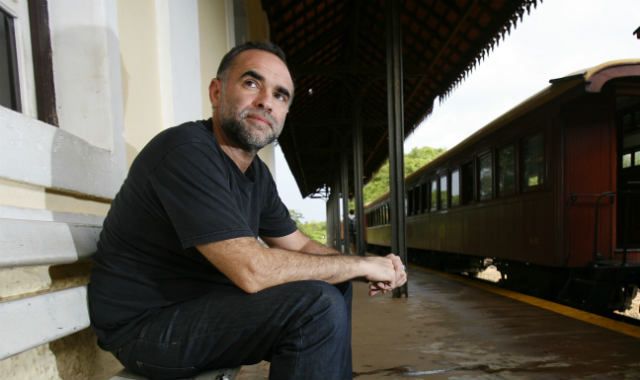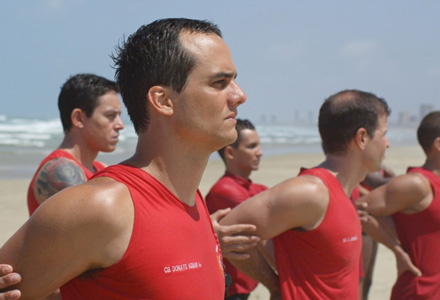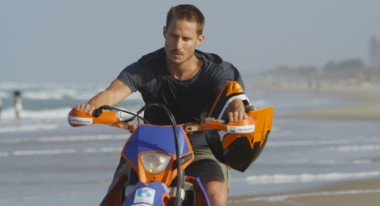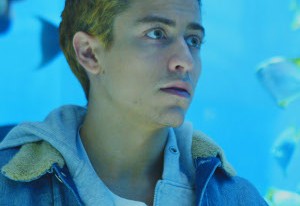 Back to selection
Back to selection
Working Class Heroes: Karim Aïnouz on Futuro Beach
 Karim Aïnouz
Karim Aïnouz I, I wish you could swim I, I wish you could swim
Like the dolphins, like dolphins can swim
Though nothing,
nothing will keep us together
We can beat them, for ever and ever
Oh we can be heroes
David Bowie, “Heroes”
“How could I do the movie without that song?” Brazilian director Karim Aïnouz asks rhetorically. I’ve just noted the few jabs he’s taken for ending his vibrant new film with the arguably overused Bowie anthem. “That’s the song that actually started Futuro Beach for me. Maybe it was excessive, but I don’t care.”
Italics mine: the polite, affable filmmaker would never himself put his speech in itals. The soft arrogance with which he delivers it, however, defines him more than would a summary bio or a litany of his filmography’s titles (Love for Sale, Madame Sata, The Silver Cliff). This man, however, is granted a dispensation for cockiness. He obsessively carries through a vision, and is one of the few intellectuals in the film industry who thoroughly enjoys the interview process of dissecting his art and justifying his decisions. At the same time, he is constructively diplomatic, a reasonably flexible negotiator in his frequent writing (and even directing) collaborations.
An openly gay Brazilian of Algerian Berber descent from a provincial town, Aïnouz thrives in the part of the marginal, having lived for seven years in New York — where he began his career working for Todd Haynes — and for the past decade, residing in Germany. Whether stigma or honorific, outsider status allow him to view his own society as if it were in a fishbowl. He may travel back and forth to his country of origin, but the foreign as base is de rigueur.
He originally studied architecture, as did I. I’m not being glib or pretentious claiming that his films are incredibly architectonic. He doesn’t merely stylize: He assembles. The end product is precise, engineered, its structure as apparent as that of a Bauhaus building. Aïnouz becomes heavily didactic when speaking about the importance of his characters’ sexuality, however it manifests itself. He will be the first to claim that he has a gay sensibility. You see it in his films and hear it in an elevated discourse rooted in semiology and psychoanalysis.
Futuro Beach is a triptych. The first third is set in Aïnouz’s birthplace, the coastal town of Fortaleza; the remainder, in Berlin, his adopted home. The drowning of a visiting German motorcyclist at the eponymous beach is the catalyst for a hard fuck between his freewheeling but inexpressive mate, Konrad (Clemens Schick), fresh from the battle lines of Afghanistan, and Donato (Wagner Moura), the repressed, suffocating soldier/lifeguard able to rescue him but not his companion. The bestial moment blossoms into an unremarkable friendship/affair. While Konrad remains in Brazil to take care of his buddy’s affairs, he and Donato’s little brother, Ayrton, forge a bond somewhere between that of older and younger sibling and mentor-protégé.
In the second section, Donato visits a more settled version of his first gay screw in Berlin, the latter’s landlocked home city. The heavily carnal relationship becomes a tight, loving partnership, but one with a host of problems. In the final third, we revisit them 10 years on, when the attractive, slightly androgynous late-teen Aytron (now Jesuita Barbosa) arrives in Berlin unexpectedly. A broken duet turns into a troubled trinity of displaced affection and geography, and an energetic triptych becomes a triple character study.
In the fall, we finished our interview over brunch barely in time for Aïnouz to rush to the airport to head back to Europe to resume work on a documentary about Madrid’s Prado Museum.

Filmmaker: Futuro Beach is a triptych, three chapters with time passing in between, each with a different heading.
Aïnouz: I always thought of this as an epic film, with a literary element. My other films are contained in a particular time and place, and I’ve never dealt well with time jumps. And three chapters highlight the fact that the story is about a triangle.
Filmmaker: The film has an elliptical structure. It begins coming out of nowhere, and ends going who knows where.
Aïnouz: With each movie, I make more and more the decision to let the characters go. As the person who has been sculpting them for so long, I enjoy letting them go. I hate endings; I think it’s good that everybody can imagine something. It’s a blank screen at the end. It was important that they just drift away from the movie.
Filmmaker: The way you frame everything — what a good architect you are! Everything’s framed, framed, framed. Konrad goes around the world, then rides a motorcycle around Brazil, and ends up in this little Berlin apartment, which is like a prison after all that. Even his appearance changes. He’s trapped in this apartment and in this German light, and now he has to be responsible.
Aïnouz: It is the first film that I framed so much. There is something about my life now compared to the way it was when I did the other films that I was very much interested in constructing something different. I think I hit the right DP [Ali Olcay Gozcaya]. It’s the first time that I worked with him.
Filmmaker: There are a hell of a lot of shots of motorcycles. I don’t want to sound disparaging and say decorative, but —
Aïnouz: But it is a bit. Wanting to make almost an adventure film, that was an important element. I think there is a certain fascination that I have with motorcycles and speed and cinema. There were moments that my editor said, “This is way too long. This scene is dragging into this scene, and so on.” And I said, “Fuck, that’s fine. Just leave it long.” There is something about that, when I watch it, that transports me somewhere. At the end, for example, when there’s the whole scene with the three motorcycles, it’s on the screen for a long time. It becomes almost hypnotic. Some moments come as almost music elements, in the sense of rhythm — like the voiceover toward the end, which isn’t really necessary.
Filmmaker: Would you call this a gay film? It opened Newfest.
Aïnouz: It’s so confusing for me. On the one hand, there is a gay story in the film, and on the other, it’s just one of the stories that I run in the film. So technically, it’s a gay film because it tells a gay love story as well. Technically, it’s also the story of two brothers. But I think it’s a very gay film in its sensibility. This fetish, this machine, there is something homoerotically butch.
Despite the fact that Donato is a civil servant because he is a fireman, [I miss seeing] people from a certain class when we talk about gay love films or gay films. These are working class people. That’s why I was so interested in [Fassbinder’s] Fox and His Friends, though that is very different, because it’s about the class struggle. Here, I wanted to have Fox and another Fox, two from the working class.
Filmmaker: The two never have any discussions. We just see their day to day lives. There is nothing “higher” than what the day to day brings. How do you make them more interesting to an audience? Giving Konrad a motorcycle?
Aïnouz: I’m really curious about studying more melodrama, almost as a technique, because I think I’ve made peace with my telenovela background. I mean, I was raised swimming in that world. I was really curious about how to build a melodrama with non-heroic male characters, despite the fact that I’m always playing with the cliché of the hero. But Donato is a power, which is really beautiful, in a way. He’s a beautiful man.
Filmmaker: We really don’t know much about either of their histories, and you don’t clue us in to their breakup. There is a very bad moment, one of them joking about it: “I wanted to fuck you.” Only the one who got dumped would say that. Did you ever have in the script more about the reasons they broke up?
Aïnouz: It’s this relationship that, when you come into it, you join somebody else’s planet and world. I think that you need to exist in that world on your own, and not always with the help of your lover or your partner or whoever is there with you. So for me, the reason was the need for independence that you need to fulfill, but they will always be a couple.
It’s not like you see them with their new lovers. I actually shot one scene where Donato had a new boyfriend and I thought, it doesn’t make any sense because these people have experienced something so strong — with the loss and Donato trying to get his life together in one place — that there is nothing that’s going to cheer them up. They are not together as a couple in a traditional way, but I think they will always be like partners in crime.
I also wanted to construct a gay love story that doesn’t end up in marriage. It ends in partnership. We’re living in a time when everything seems to be leading to marriage, and I’m very reticent about that, and critical of it. But it was very important for me that there is a family of sorts. It was interesting for me to keep that family running, but not with matrimonial ties.
Filmmaker: A response to the whole gay marriage thing?

Aïnouz: Yeah, in a way. I’m very for gay marriage, don’t get me wrong. I think it’s a right that we should have, but I don’t think it’s the only solution for an affectionate or romantic partnership. I think this was a reaction to that, and I think it’s only human that people that are together for eight, 10 years, that at some point, they break up.
I also thought it was really good that Donato could make his life on his own at that point. It was not constantly this relationship with somebody from Germany — he could, too, have his own life. Also very much at play was the fact that I didn’t want to have a happy couple story. I don’t know what is happy, but it was very important to me that these characters existed independently from each other.
Filmmaker: There’s a little passive-aggressive behavior between Konrad and Donato, in lovemaking, in the hitting. It’s very visceral, and the lovemaking is hardly sexual.
Aïnouz: It’s violent. Sex for them is an animal act that triggers affection. Someone in Brazil thought that the movie was actually a bit homophobic, because there was no affectionate, romantic thing. I think it’s quite the opposite. It’s a celebration of another kind of sexual practice. When one takes the other’s pubic hair from his mouth — for me, that’s affection, that’s intimacy.
Filmmaker: Do you think these guys, after the breakup, would be gay?
Aïnouz: I think they would. I think they are very gay. Gay in the sense that they like men.
Filmmaker: Did you have any trouble getting them to be completely naked on screen?
Aïnouz: No. When I proposed the roles to them, I told them that.
Filmmaker: Wagner is well-known now, right?
Aïnouz: He is. He is the biggest Brazilian star at the moment.
Filmmaker: Because of [José Padilha’s] Elite Squad?
Aïnouz: That movie was seen by 11 million people. You cannot walk with Wagner in the street. I think he wanted to do something else because he’s been locked into that role for so many years.
Filmmaker: He’s imperfect. And he’s not that good looking. There’s something angelic about him, without being feminine, and he’s a good actor.
Aïnouz: There’s something quite genuine about him, too. I think it was very courageous of him. It’s like getting Mel Gibson to do a role like that.
Filmmaker: And the German actor, Clemens Schick?
Aïnouz: He’s known, but not super famous. He was in Nan Goldin’s crowd for a long time. If you look at all those pictures from the ‘90s, that’s him. They became very close friends.
Filmmaker: There’s a scene on the beach in Brazil where Donato and his fellow military lifeguards do calisthenics, shot in a very Riefenstahlian way. Then when his colleagues run together into the surf, Donato stays far behind. It’s as if he does not fit into that strict order, something we might expect more in the scenes in Berlin. The body becomes the marker for a general social order, fitting in or not.
Aïnouz: I was interested in this ideal of the body, and this conceptual idea of filming the body [in a way] that was much more about how the body is disciplined than an elegy to the body or sexuality.
Filmmaker: What do you think was going through Donato’s mind when he paused at the ocean, when his colleagues were jumping in as a group?
Aïnouz: I think it detaches him from the group, diverging, moving outside of the situation, then disappearing afterwards. It’s a drifting away. This is a place of order, of control, of isolation. That’s why it was more important to film the body itself, and that’s a military exercise we see. A military exercise can be sexual for some, but that is a military exercise at the end of the day. I wanted to build these layers of order that Donato was having to obey — as a family member, as a member of the military. My composer always mentioned that scene as the Leni Riefenstahl one.
Not to go on an autobiographical binge here, but that is the beach that I was raised near. When I was little, my mother got a mortgage to buy a small house. So, we moved to the outside of this city; that neighborhood was the periphery. It was not the beach where we lived, but it was the neighborhood between the city and the beach where it takes place. That beach is outside the city. I would go a lot. I mean, I would have to hitchhike to go there because it was quite far to walk.
One of the things that that place really inspired in me, or teased me, or triggered something in me was — this is a corner of Brazil, right? And then this beach is here. It’s an open sea, and if you’re there, you look north. When I was growing up, I imagined a lot what is out there. This was a small town, by Brazilian standards. When I was growing up, there were about 500,000 people; now there are three million. It’s not a small town; it’s a small city.
This city was isolated from everywhere. I always compare it to Memphis, Tennessee, or to Arkansas. It’s the backlands. Not only that, it’s a city that had no history. The name in Portuguese translates into “fortress.” And it was a fortress. The economy of the state was based on sugar cane. It’s a city that’s built between the desert and the ocean. Nothing grows there. The land is extremely salty.
When I started to do this film, I was imagining about these lifeguards who sit on these towers every day, five or six days a week. They spend 99 percent of the time up there, because unless there is an accident — and it seems like there are a lot of accidents — what is on their minds? What do they imagine is just beyond the horizon line? That’s how this character of Donato started. I think he’s drifting into this vision that he had from imagining what was on the other side. The ocean becomes a bridge — a place to cross, a place of adventure.
Filmmaker: How much was that tied up with sexuality?
Aïnouz: I think a lot. It’s tied to a sense of displacement, in which sexuality plays a part.
Filmmaker: There’s a lot of homoerotic stripping in the film, a lot of shedding of clothing. It’s not hardcore, but shirts come off and it’s kind of like you’re teasing.
Aïnouz: Flesh. It’s not exhibitionist flesh, just flesh.
Filmmaker: You connect this flesh with the landscape, and the seascape as well.

Aïnouz: It was important for me that in such a masculine film these bodies be ordinary bodies, not sculpted, designed bodies. They are not constructed. It’s not like these guys swim five kilometers a day. They do swim every day, but they spend a lot of time waiting around for something to happen.
There was another thing that’s important in this context: this idea that the tropics equals paradise. I don’t know how much people are going to get this. It’s a hard sun, and it’s a very tough light. It’s shot with 50 ASA film stock, just so I have everything hard in the colors. It’s not even tropical light: it’s like three degrees from the equator. It’s not because the sky is blue and the sea is green that it’s like paradise.
Filmmaker: Donato was clearly in the closet, whether he had acted on it or not. Then he had an opportunity.
Aïnouz: They share a very harsh moment of losing someone, and that is a bonding situation. It’s not like he was living in an African country where homosexuality is a crime, but in the area where Donato lives, it’s definitely an issue. The situation with the death of Konrad’s friend Heiko was messy. I wanted both Konrad and Donato to be very vulnerable: Konrad from being in the war in Afghanistan, Donato from being a hero.
I also wanted to experiment with storytelling with gaps that allow you to imagine things. Maybe for him, he was in the closet; maybe for you, he was not really. There is a scene – now, we’re jumping really ahead in the film – when he is asked, Why did you leave? He never really answers, because it’s so complicated to answer the question.
Filmmaker: Maybe to have the feeling he had on the beach by the sea in Brazil, Donato finds open spaces in Berlin?
Aïnouz: In the place that I come from, you don’t see the city much. You just see it from far away. I was walking in the streets in New York today and thinking about this idea of the possibilities we have in this part of the New World, the same as the idyllic ideal of the Tropics.
I was thinking, “There’s a lack of mystery that I feel in this city, but why? Is it because I lived here for so long? Or is it because this is the New World?” In the New World, you can pretty much map history. It’s 500 years old, but it’s not 3,000 years old. It’s a space full of holes, the New World, and the tropics is a space that’s not occupied. In Berlin, when you have these empty spaces, they look red because they look full of blood. There is an immediate history that you attach to these places. But it’s not only the history of the war, it’s what’s been there for hundreds and hundreds of years.
In Berlin, there is a sense of what’s coming. How is this city going to become something else? How is it going to reconstruct itself? In Brazil, and in this side of the world, I feel like when it’s empty, it’s a different feeling. You know, the known places in this part of the world, there is something quite ghostly about them. I think that this film could only be done in Berlin and maybe in Beirut. Berlin was a city cut in half. But I think these are the only two cities that could be characters in this film, because I think despite the fact that Donato comes from this idyllic, bright, colorful place, it doesn’t mean that it’s a place devoid of a certain melancholy. And because Berlin is gray, that doesn’t necessarily mean sad.
By the way, I always start a film with a place, then I begin drawing the characters. I had a love affair with Berlin, and also with the place where I was brought up.
Filmmaker: Berlin has been a place of bombs and bunkers.
Aïnouz: Yes, but it’s also a place of reconstruction. The confluence of German culture and then of Jewish culture, and then the extension of Jewish culture, and then the presence of Communism and the friction of capitalism. There are so many frictions happening in that space. It’s really interesting to be in a place where you can actually think about — besides the horrible sides of Communism — what was interesting about daily life within that system, and how these can be appropriated for our daily life. It’s only in that place that we can imagine a future with all these elements at play.
Filmmaker: Okay, but can you make a parallel with the ocean that keeps coming up as a reference? Maybe there isn’t one.
Aïnouz: No, I think there is one. There is the need that the film begin and end in the ocean. The ocean, for me, is the desert. It’s a place we occupy or it’s a place of possible occupation. This is not at all in the movie, and this is impossible to address in the movie – but there is water in Berlin. There is sea water in that city, and it’s a city that’s built on water, because there are swamps. Berlin, if you go like, 20 centimeters or 30 centimeters down, it’s like white sand.
The sea can be a place of life, but it can also be a place of death. Donato never really left the sea behind: He’s working in an aquarium in Berlin. There is something about experiencing a different climate and a different light and a different relationship to water… He says, “I could never live in a place without a beach,” but I think that’s precisely why he wanted to stay there — because it was a completely different place.
Filmmaker: I want to talk about the role of Ayrton, the younger brother, the idea of this ménage-a-trois. Donato goes back to an earlier version of himself. Even though Konrad barely knew this kid, you saw the rapport they had back on the beach. And then, they’re going off as kind of a threesome. In the scene where Ayrton steals Konrad’s bike, it’s more than just stealing the bike.
Aïnouz: I wanted to have tension there. I wanted to show that Ayrton felt that Konrad had stolen his brother from him. I wanted the film to show Ayrton pushing Konrad away but also seducing him. There is a constant play.
Filmmaker: There are suggestive events, such as when Konrad tells Ayrton to take a shower. And Konrad is aggressive, like the nasty way he treats Ayrton’s girlfriend.
Aïnouz: There is definitely this shifting position of the character. This is what was interesting, to me, that one is in love — the younger brother, the older brother — it’s not only the shifting positions, but also, the shifting roles. So, there’s the younger brother and the older brother, sometimes like father and son. And then, there is the lover. When the younger brother becomes older, he tries to settle things with his older brother. But to do that, he will seduce. It was very interesting to explore the emotional flux.
